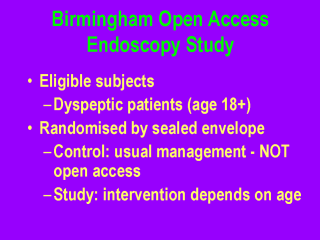 |
The
study aimed to evaluate the effectiveness of two management strategies for patients
presenting in primary care with symptoms of dyspepsia. Two randomised controlled trials
were conducted concurrently, with eligibility being determined by the patient's age at
presentation. Randomisation was at the individual patient level . Initial endoscopy trial:
Eligible patients: 50 years of age or older.
Intervention: Referred for open access endoscopy.
Test and endoscopy trial
Eligible patients: Under 50 years.
Intervention: Test for Helicobacter pylori antibodies with Helisal near
patient test. Patients with positive results referred for open access endoscopy; those
with negative results received symptomatic treatment only.
Control arms (both trials): Managed according to "usual practice"
excluding open access endoscopy. This included antacids, H2 receptor
antagonists, proton pump inhibitors, outpatient gastroenterology referral, facilitated or
direct access endoscopy (for example, vetted by consultant), and testing for H pylori.
Outcomes: Primary outcomes change in symptom score and cost effectiveness. Secondary
outcomes quality of life and acceptability. |
